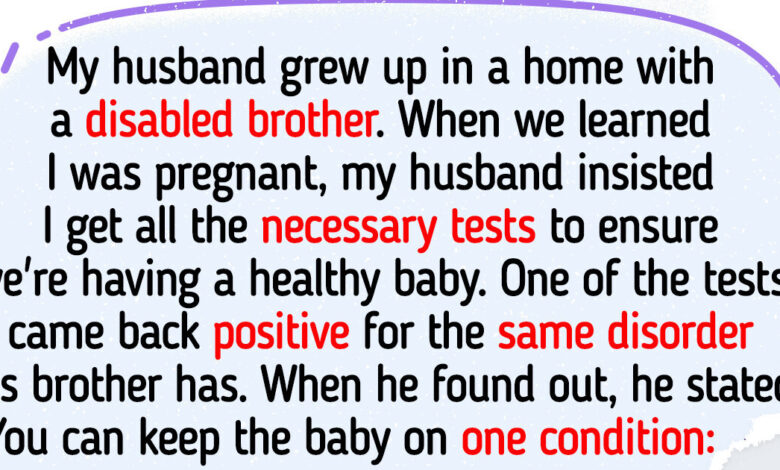I’m Pregnant With a Disabled Baby — My Husband Wants Me to Make a Hard Choice

Our reader thought she had everything—an affectionate husband, a bright future, and the joy of expecting a child. Yet, as life sometimes does, reality intruded in a surprising and painful manner. Instead of receiving support from her husband as she faced challenges with her baby, she was devastated by his unexpected behavior, which shattered her vision of the future. Desperate for perspective and guidance, she wrote a letter to Bright Side.

![]()

![]()

![]()

![]()
Thank you, Emily, for trusting us with your challenging story. We’ve carefully reviewed your situation and have done our best to offer thoughtful and supportive advice to help navigate this difficult time.
Reconnect With Your Values
In a moment of crisis, it’s important to reconnect with your core values and beliefs. Reflect on what matters most to you and how this decision aligns with your own moral compass. Remember that your feelings and instincts about the baby are valid and important.
It might help to journal or speak with a trusted friend or counselor to gain clarity. Your values can guide you through this tough decision, providing strength and perspective.
Seek Professional Guidance

![]()
Consider seeking advice from both a family therapist and a genetic counselor. A therapist can help you process your emotions and provide support as you navigate this difficult time, while a genetic counselor can give you detailed information about the genetic disorder and its implications.
This dual approach ensures that you’re making an informed decision while also addressing your emotional well-being. Professional guidance can also offer strategies for coping with the potential future challenges, whether you choose to keep the baby or not.
Communicate Your Feelings
Have an open and honest conversation with your husband about how his response has impacted you. Express your feelings and the emotional weight of his stance on the situation. Sometimes, people make seemingly cold decisions when they feel overwhelmed or disconnected from their emotions.
Sharing your perspective might help him see the situation through a different lens and reconsider his position. Clear communication could lead to a deeper understanding between both of you.
Explore Support Networks

![]()
Reach out to support groups for expectant mothers or those facing similar challenges. Connecting with others who have experienced similar situations can provide practical advice and emotional support. You don’t have to go through this alone, and support networks can offer a sense of community and reassurance.
Exploring these resources can also help you feel less isolated and more empowered in your decision-making process.
Consider Your Long-Term Needs
Think about your long-term needs and what will be best for you and your baby, both emotionally and practically. Evaluate whether you are prepared to handle the responsibilities of parenting on your own and what kind of support you would need. Consider the potential impact on your future if your husband decides to leave the relationship.
It’s crucial to think about your own well-being and the future of your child as you make this decision.
In a marriage, mutual support is essential for a healthy relationship. However, when one partner attempts to exert control over the other, it can lead to significant tension and instability. In this article, another Bright Side reader reached out for guidance regarding her husband’s unreasonable demands about their childbirth plans.


